9 Unique Experiences as the Sibling of a Paralympian
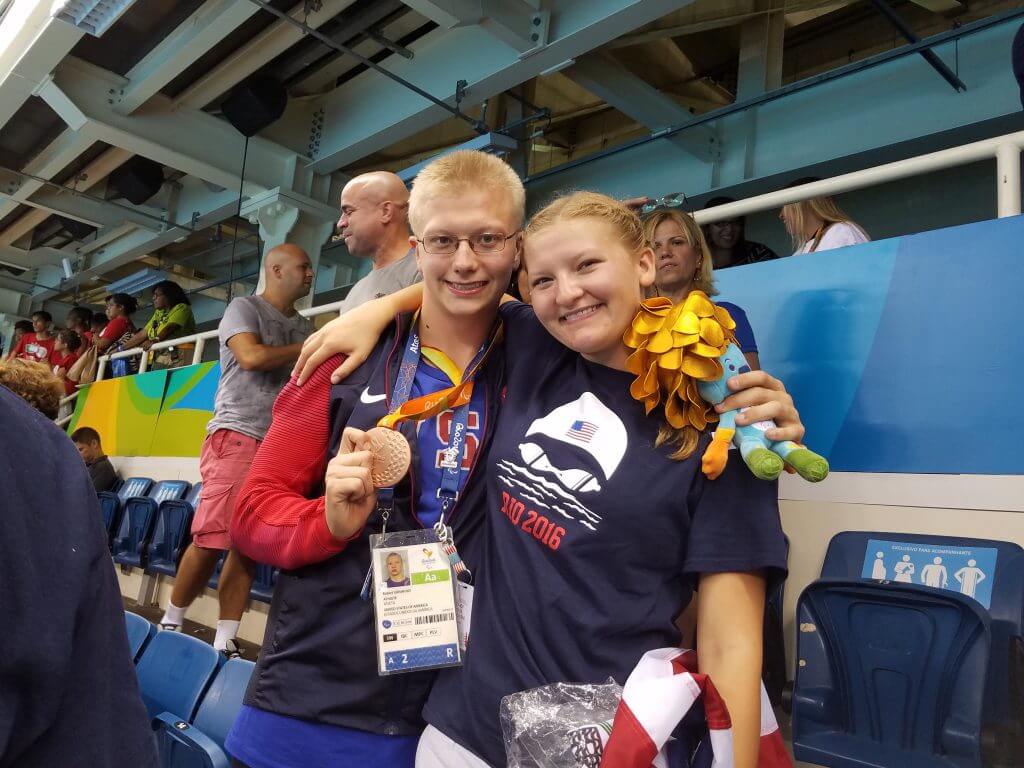
On the day in which Robert Griswold captured the gold medal in the S8 100-meter backstroke at the Paralympic Games in Tokyo, we resend this piece by his sister, Molly Griswold. The article is a wonderful look and tribute to being the sibling of a Paralympian.
By Molly Griswold
Daily annoyances, inside jokes, rivalries and closet raids are typical occurrences when you live with siblings. Even when your brother or sister is a Paralympian, the bond you have as siblings is the same as any other. He or she just happens to be a world-class athlete – something that’s not so normal to everyone else.
To understand a little more about what it’s like, here are nine things that happen when you’re the sibling of a Paralympian.
1. You steal your sibling’s team-issued gear.
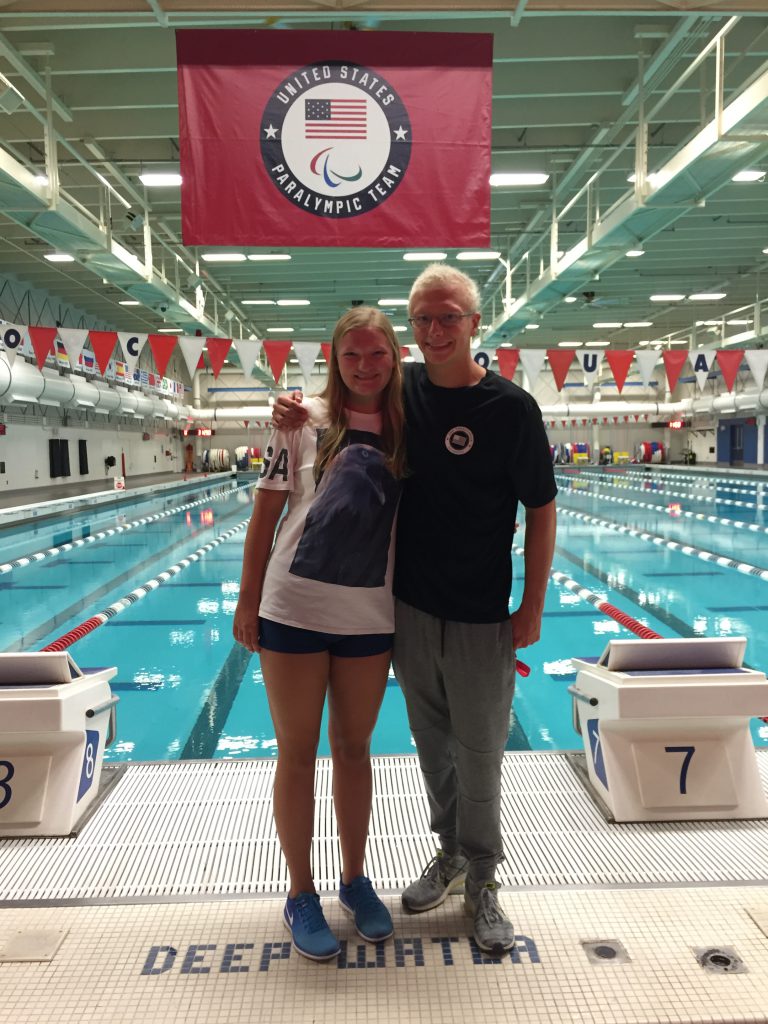
Photo Courtesy: Linda Griswold
Raiding the closet of a Paralympian is like taking a barcode scan gun to a Nike store. A patriotic sea of red, white and blue Dri-fit shirts tempt you from their hangers. USA logo pants and stars and stripes jackets – this wardrobe is like dressing for the Fourth of July every day. While your sibling is supplied with complimentary Team USA gear, the closest you might come to being on the receiving end of complimentary items is taking your weekly stroll through Costco for free samples. But you’re fine with that.
2. You perceive your idols in a different way.
A casual lunch with Nathan Adrian at the Olympic/Paralympic Training Center? Chilling in the hot tub after practice with Katie Ledecky? Your sibling may have done it. While swimming at the pinnacle of success, occurrences like these are normal. The “idols” you once watched on TV eventually become real people in your eyes. Although these athletes are greatly admired, it quickly becomes apparent that they – just like your brother or sister – are normal, talented people intensely training toward a common goal.
3. Your accomplishments are never quite the same.
https://twitter.com/Molly_Griswold/status/1051135915782037504
It is a normal occurrence for someone to come up to you saying, “Congratulations!” only to realize a few seconds into the conversation that they are not referring to your success at all. This is understandable, however, considering that some of your typical accomplishments may include finessing a free meal on your Chick-fil-A app or matching all of your socks while sorting laundry. Although your accomplishments are important in their own right, there is nothing quite like seeing a picture of your sibling shaking the hand of the President of the United States on your fridge every day.
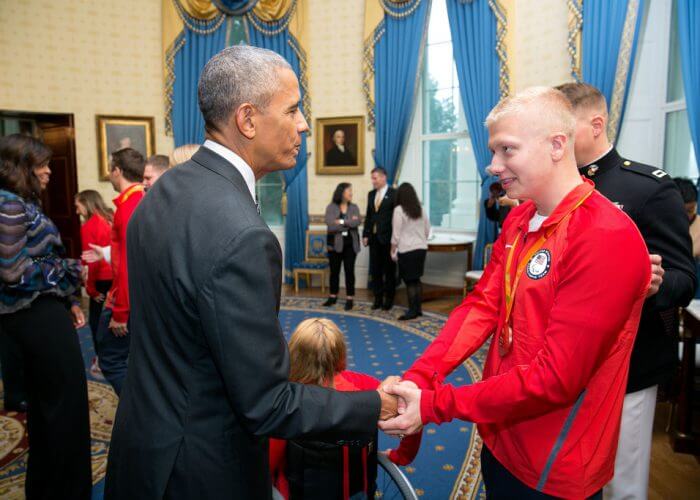
Photo Courtesy: Robert Griswold
4. But you support those accomplishments more than anyone.
Although you cannot exactly compare breaking records and breaking bones, the joy of watching your sibling standing on the podium while the flag of your country rises is indescribable. In these moments, you feel a sense of pride far greater than you have ever had for yourself. Just like any other siblings, you are each other’s biggest cheerleaders and will support all the goals you each achieve.
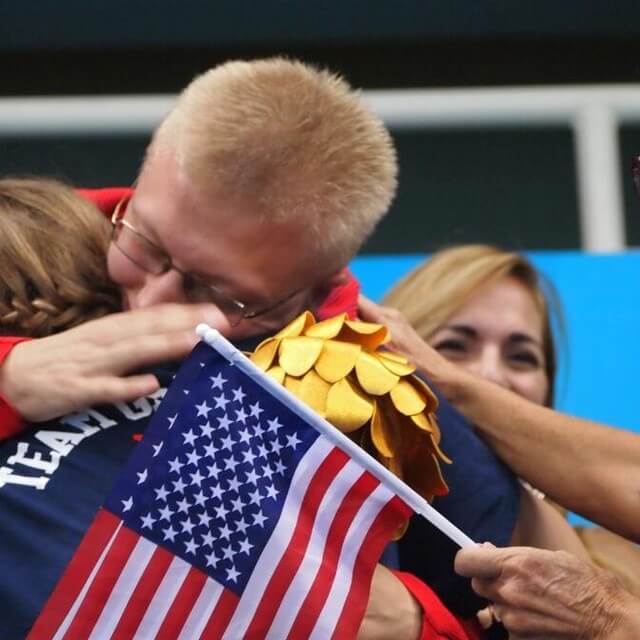
Photo Courtesy: Rico Reis
5. You catch them when they fall.
Just as you support your siblings’ accomplishments, you are also there for them when they fall short. You understand how defeated they might feel when dreams they have developed from the beginning don’t come to fruition as planned. You are also the first person to jump to their defense when someone makes fun of their disability. You’ve learned how to protect them from the bullies who never quite grew up. But they protected you, too.
6. You understand the importance of hard work.
https://www.instagram.com/p/ByJwgwvpafI/?utm_source=ig_web_copy_link
Paralympians train with the same intensity as able-bodied athletes but also have the added struggles of conquering health issues and overcoming stereotypes. These athletes must work harder to grow stronger to compensate in areas where they may be physically lacking. Watching their modifications to strokes and exercises is both fascinating and motivating. Have you ever tried to race someone while using their same modifications? For example, not using your legs in breaststroke? You might never recover from the accompanying shame if you do.
7. You get the opportunity to travel.
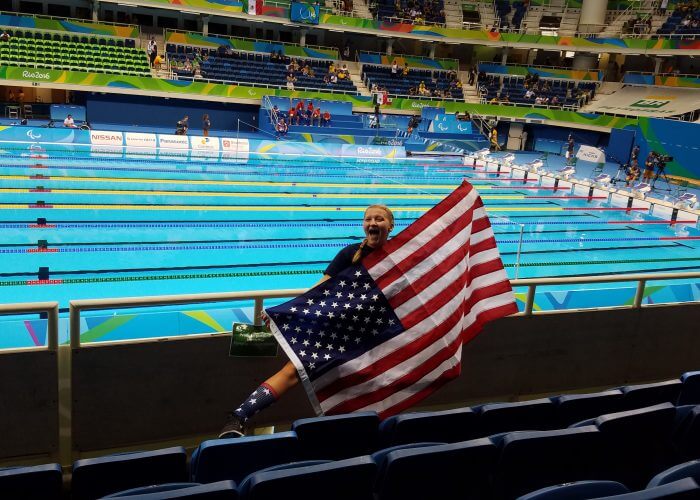
Photo Courtesy: Linda Griswold
Croatia, Italy, Brazil, Australia… you name it, the pin has been placed on his world map, and the passport has been stamped. Much of your globetrotting is done vicariously, but if you’re fortunate enough, you may get the opportunity to accompany your sibling. Adventuring in this way allows you to visit some amazing places with eye-opening cultural experiences. Cheering for your country while interacting with people from all over the world creates magical moments.
Tyler Young, brother of two-time Paralympian Colleen Young, had the chance to travel to Rio de Janiero in 2016. He describes roaring crowds that made for a competitive environment and aquatic center fans who were friendly and enthusiastic.
Young earned her first ever Paralympic medal in the 100 breaststroke, and her brother was there to live that moment with her. “Watching Colleen swim on the international stage like that is a huge blessing for our family. She puts in so much work to get to that point, and then we get to sit back and cheer all that hard work on,” her brother proudly says.
8. You carry a unique perspective on life.
Being the sibling of a Paralympian allows you to have a unique perspective on the way you look at “impossible” challenges and physical (or sometimes cognitive) differences. You view people with disabilities in a different light. In fact, you are unfazed by a disability on which other people may take pity.
Eli Coan, UNC Chapel Hill swimmer and brother of London 2012 and Rio 2016 Paralympian McKenzie Coan, talks about some of his fondest memories with his sister growing up.
“I think the funniest thing about growing up with my sister, McKenzie, was the reactions of everyone when they saw us always being competitive. When we were eight years old and racing a 25-yard freestyle, if we got the chance to cut someone off to win the race, you best believe we were both doing whatever it took to win. I think that’s what caught people off guard. They couldn’t believe I wasn’t just letting my sister win.” -Eli Coan
That competitive spirit between siblings acted as a catalyst for both the Coan siblings’ swimming careers – one that would lead to McKenzie becoming a three-time Paralympic Gold Medalist.
Coan says that nothing ever felt “different” having a sibling with a disability. He also explains the way he views life: “Growing up around McKenzie and the rest of the para-swimming [community] opened my mind to a myriad of lifestyles. I wouldn’t have traded it for a different youth.”
9. You advocate for change.
Seeing the work that Paralympians put into training and the obstacles they overcome makes their siblings eager to see them become as highly revered as Olympians. Although there has been increased visibility of the Paralympic Movement, there is still much to be done to ensure that these elite athletes are recognized in the same way as their Olympic counterparts.
Just this year, the decision was made to ensure that Paralympic athletes receive the same amount of compensation for winning medals as Olympians. Amounts increased from $3,750 to $15,000 for Bronze; $5,250 to $22,500 for a Silver; and $7,500 to $37,500 for a Gold Medal.
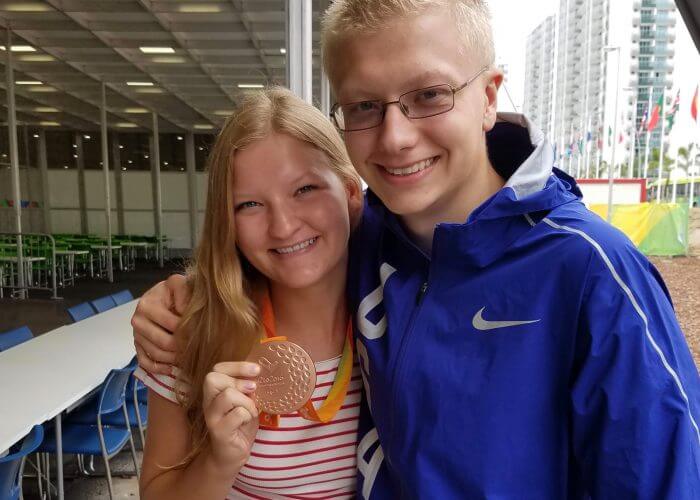
Photo Courtesy: Linda Griswold
In most recent news, the title change was announced for the United States Olympic Committee to become the United States Olympic and Paralympic Committee. Once known as the USOC, the organization is now formally known as the USOPC. It is important to note how the change of one letter can mean so much for Team USA and the Paralympic community.
https://twitter.com/USParalympics/status/1141750450670178304
As a sibling of a Paralympian, you have your fair share of sibling rivalries and incomparable accomplishments. But you are grateful enough to see the importance of promoting inclusion in success, freedom in sport and supporting all who reach for incredibly high goals.
-All commentaries are the opinion of the author and do not necessarily reflect the views of Swimming World Magazine nor its staff.




Great article Molly. You and Robert are an awesome team.
Amazing article! Couldn’t be done without great siblings!
What an amazing article. It brought me to tears! I love the relationship that you and Robert have. Keep up the amazing writing Molly!
Molly, you are a very talented writer! I loved this article. Thank you.
Great article! Privileged to be acquainted with Robert.
Great article Molly! Thank you for sharing your unique view into the Paralympic swimming world.
Molly! This was such a great article, and perfectly timed. Blessing to you and your family!
Molly, your sense of humor makes this a fun read. I especially like the comparison between the broken record and the broken foot.